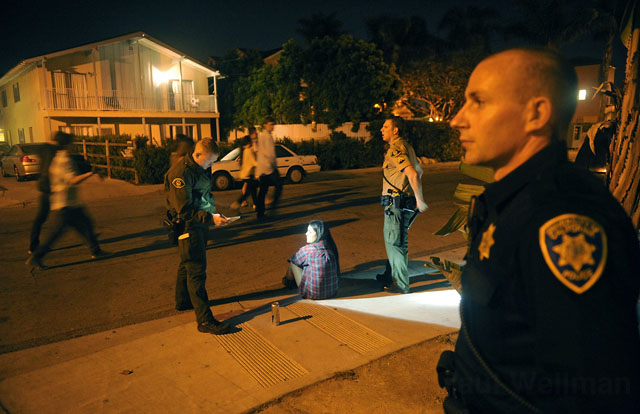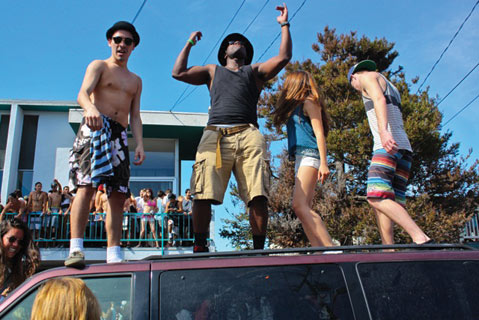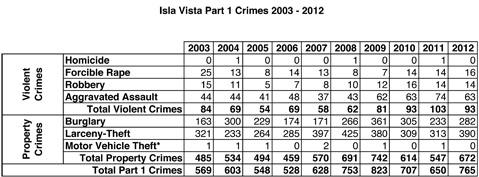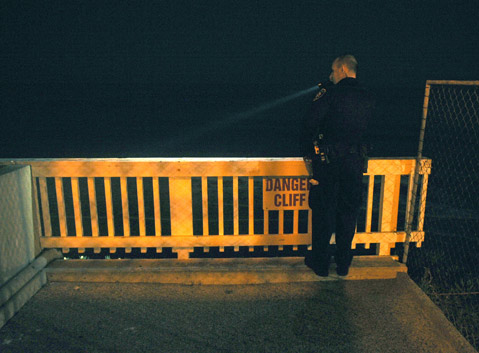Five Miles in Their Shoes
A Night in the Life of Isla Vista Foot Patrol

“If we get into a fight, and I give you directions, follow them immediately,” said Senior Deputy Brad Welch. “And if it looks like we’re losing, help us.”
With those orders and a directive to duck should they reach for their batons, Welch, his partner Deputy Jeff Roberts, and this reporter left the Isla Vista Foot Patrol headquarters for a 10 p.m. - 3 a.m. weekend shift through the seaside college town, where beer pong and dubstep fuel big crowds of rowdy coeds.
Welch wasn’t looking for a fight, and his mini-briefing wasn’t meant to be dramatic. It was a matter-of-fact warning. On any given weekend night, the Isla Vista Foot Patrol (IVFP) — made up of 14 Sheriff’s deputies and seven UCSB police officers — deploys eight to 12 men and women to oversee more than 25,000 people packed into a 1.85-square-mile patch of middle- and lower-class neighborhoods. Some of them hoof it; others patrol on bicycles and in cruisers. “When things get crazy,” explained Welch, “you suck up into the shadows and cross your fingers.”
While the small force is able to keep relative peace in a community famous for massive parties and carefree yet contrarian attitudes, more IVFP troops are assaulted than any other group of peace officers in Santa Barbara County. From 2009-2012, there were 84 street assaults against the IVFP; the next highest was in Santa Maria with 40. Last Halloween, an IVFP sergeant was punched so hard he’s still not back at work. More recently, a young suspect high on bath salts tried to eat Welch’s fingers, and another ripped the sprinkler head off a holding cell’s ceiling, flooding the room and shorting electrical systems.
While these flashes of violence make headlines — especially now that UCSB’s alert system warns students of recent assaults, rapes, and robberies — the IVFP and its commander, Lieutenant Ray Vuillemainroy, have been quietly working to reimagine the adversarial relationship between cops and students. Since he came to Isla Vista in 2010, Vuillemainroy — a 17-year veteran of the Sheriff’s Department who is originally from San Francisco and has a doctorate in education — has pushed “community policing” by reaching out to business owners, permanent residents, students, their peer governments, and UCSB/SBCC staff to tackle priorities.
“Crime is a community issue, so it only makes sense that we work together to fight it,” said Vuillemainroy, who’s increased patrols in problem areas, installed more street lamps, and continued a sticker campaign to educate residents that locking doors could reduce burglaries by 80 percent. His pragmatic approach is catching the attention of law enforcement agencies near and far, including Tajikistan, which recently sent a cadre of generals to learn about improving relations between their citizens and police force. Vuillemainroy also traveled to Egypt to help state authorities at the height of the country’s violent upheaval.
Though his community policing is making an impact, a decade of I.V. statistics still show an upward trend in serious felonies. “I think we’ve come a long way, but there’s more work to be done,” said Vuillemainroy.
His most recent challenge was the spring break party Deltopia, a spin-off of the now-squashed Floatopia beach bash, that happened this past weekend when 18,000 partyers took to Del Playa Drive under a warm Saturday sun and triggered 440 calls for service. Twenty-three people were arrested, 71 were issued citations, 59 got tickets from the Highway Patrol, five got DUIs, and 44 people wound up in the hospital (including four who were standing on an overcrowded frat house balcony when it collapsed under them).
Tragically, at around 8:20 a.m. Saturday morning, the body of 18-year-old Giselle Ayala was found by a jogger near the surf line west of UCSB’s Campus Point. A Cal Poly freshman from Santa Rosa, Ayala had arrived in Isla Vista with her friends the night before to attend Deltopia. A toxicology report is pending, and authorities continue to investigate Ayala’s death but say her injuries are consistent with a fall from the cliffs above the beach.
Third District Supervisor Doreen Farr said she was “greatly saddened” by the news. Efforts to end the many public-safety problems associated with past Floatopias haven’t worked, Farr said, as revelers have simply moved the annual super party off the beach and onto the streets. “Going forward, we need to redouble our efforts to see what we can put together,” she said. “Obviously, we’re going to have to do more.”

Saturday Walkabout
Before starting our five-mile trek along Del Playa, Sabado Tarde, and Trigo roads, Welch took me through the IVFP building, which was built a few years ago to replace the cramped quarters behind Freebirds World Burrito. Walking past a confiscated potato launcher, historical photographs of deputies in milkman-like uniforms, and the bullpen where officers ate almonds and filled out paperwork on rows of computers, Welch showed off the holding cells, interview rooms, upstairs kitchen, bunk beds, and bathrooms with air-conditioned lockers.
Outside, he and Roberts explained how the Foot Patrol enjoys the challenge of the Isla Vista assignment. “Working here will test your patience,” said Welch, though few recruits or volunteers drop out. “They know the game and want to be there.” For years it’s been typical to arrest — or “hook” — six to 20 people on a gamut of offenses each night, but some things have changed, as Roberts explained, “It seems like there’s a little less respect for law enforcement now.” As if on cue, a man walking in the opposite direction flicked a cigarette butt right at the deputies’ feet. Roberts shone his flashlight from the ground to the man’s face and said, “Pick it up.”
Shortly after, Welch and Roberts stopped another college-aged man carrying an open Fanta bottle. A quick sniff test revealed it also held vodka. The incredulous man said he was from Venezuela, had traveled here for spring break, and did not know about open-container laws. The deputies made him pour out the cocktail, issued him a citation, and sent him on his way. Though the encounter began with surly words from the spring-breaker and curt responses from the deputies, they parted ways with fist bumps and friendly words of caution.

Welch — who has been with the department since he was 19 years old and was promoted to sergeant not long after our walking tour — said many arrestees are out-of-towners in college, high school, or area ESL (English as second language) courses, and the rest tend to be UCSB and SBCC students. There are currently 9,000 UCSB students living in I.V., according to campus spokesperson Andrea Estrada, and anywhere from 800 to 900 City College students depending on the semester, said that school’s spokesperson Joan Galvan. Many tickets, Welch went on, are for those who break either the county’s Social Host Liability Ordinance, which docks party-throwers who provide alcohol to minors, or its Noise Ordinance, which mandates loud music be shut down by midnight. Though the fines are steep for both offenses, they do little to dissuade repeat behavior, Welch noted.
On patrol, Welch and Roberts are always looking at people’s hands in case they’re hiding a beer or cupping a joint. Minor-in-possession and public-intoxication charges are especially common, and depending on the situation — age, inebriation level, with friends or alone, etc. — they may be cited and released or booked into County Jail. At one point in the evening, a man under the influence and carrying a can of Natural Ice beer walked straight toward the deputies. “What’ve you got there?” asked Welch. “You want it?” the man asked. “No, thanks,” responded Welch. “I’m working.” Because he was with a much more sober buddy, the man was let go with a citation and directions to head home.
While more than a few people waved “hi” to the deputies, others hurled insults from balconies or down the road and out of sight. One sarcastically hissed, “Cops! Cops! Cops!” as he walked past. “It can get annoying,” shrugged Welch, “but it’s just people exercising their First Amendment rights.” A line was soon crossed, however, when a glass bottle arced from above and smashed into a nearby parked car. Backing into a darkened driveway, Welch and Roberts quietly watched the crowd for the next 10 minutes.
Catching a public urinator in the act, Welch turned on his flashlight and grabbed the man from behind. “Whoa!” the startled man yelled. “No pictures!” He was made to pour out his flask of rum and asked to sign a ticket. Because he came from a nearby party, his citation counted as one strike against the gathering. If two more arrests were made in connection to it, the IVFP would shut it down, but the party ended before that happened.
Altogether, they cited two people for public urination, a few for carrying open containers, and a couple of others for public intoxication, which translated to a very quiet night. As they took down the basic information on one of the subjects — or getting their “horsepower,” as they called it — a girl walking alone stumbled directly in the path of an oncoming car. Because she couldn’t tell the deputies where she was going and was clearly quite drunk, she was taken back to the IVFP for fear of hurting herself or being sexually assaulted. Welch and his colleagues also frequently call UCSB Community Service Officers to escort solo women home.
As the shift came to a close, Roberts spotted a man lurking along Del Playa Drive and, after a quick conversation, discovered he was out on bail for burglary. Back at the station, he joined a suspect caught smashing the side mirrors of parked cars, a young UCSB student who had threatened suicide and had been on her way down to the beach with a cocktail of pills and other drugs, and an arrestee who had allegedly assaulted a female companion’s boyfriend. Some were crying, others joking, the rest sitting indifferently in handcuffs. All were taken to jail in a van that regularly shuttles between the Turnpike Road campus and the IVFP home base.

Daunting but Doable
Though trouble borders on the minor or petty, Isla Vista is no stranger to serious crime. Why it’s on the upswing is likely due to a combination of factors, according to Vuillemainroy, including rising population density, tough economic times, and the increasing releases of convicted criminals from overcrowded prisons and jails. Burglary incidents dipped when the IVFP and UCSB’s Associated Students launched the “Stop Burglaries in I.V.: Lock Doors and Windows” campaign in 2011, but a crew of now-captured thieves from Los Angeles made them spike again last year.
Budget strain has cut gang and narcotics detectives from the IVFP and reduced help from the CHP and other auxiliary patrols, and Vuillemainroy could certainly use a community resource officer to handle the robust homeless population full-time. Meanwhile, he maintains close ties to the staff and student governments of UCSB and SBCC, and right now they’re working to raise funds for cliff-side fencing along Walter Capps Park.
Rhandy Siordia, vice president of UCSB’s Associated Students, appreciates the outreach and weekly office hours. “I do admire Ray’s community policing strategy,” said Siordia, “and he’s always been very receptive to us.” Siordia believes the IVFP’s biggest public relations challenge is the misconception that officers concentrate on small infractions, like busting people for biking without helmets or shutting down parties that go too loud, too late. Most people don’t realize, he said, that it’s actually the CHP writing roadside tickets and that Foot Patrol officers only end parties because of a new county law (though they do often get complaints from residents whose kids can’t sleep).
Vuillemainroy gives all the credit to his hard-working, tight-knit troops. “These are the men and women that do it,” he said. “They’re the ones making it happen.”


